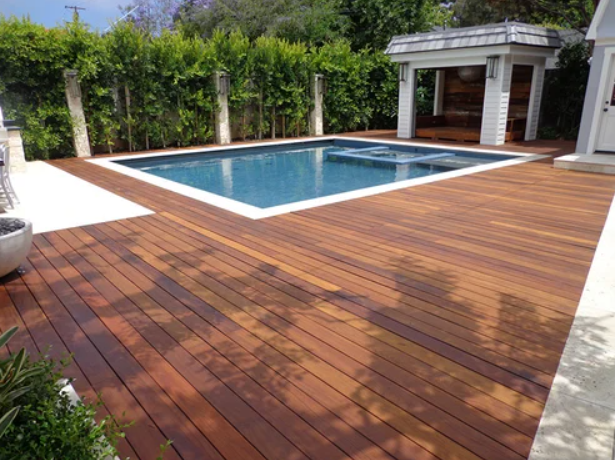
Ipe wood, often referred to as Brazilian walnut, is a highly sought-after exotic hardwood renowned for its durability, beauty, and versatility. Native to Central and South America, this dense timber has become a favorite for decking, flooring, and outdoor furniture projects. Let’s dive into what makes Ipe wood so unique and why it’s an excellent choice for both residential and commercial applications.
What Is Ipe Wood?
Ipe (pronounced “EE-pay”) comes from the Handroanthus genus of trees, which thrive in tropical climates. Its dense structure, natural resistance to weather, and impressive lifespan make it one of the hardest and most durable woods available. Often compared to teak, Ipe wood is much more affordable and offers similar, if not superior, benefits.
Key Characteristics of Ipe Wood
-
Unmatched Durability Ipe wood is extremely dense, with a Janka hardness rating of over 3,500, making it one of the hardest woods in the world. This density contributes to its remarkable resistance to scratches, dents, and heavy wear.
-
Weather Resistance Naturally resistant to moisture, rot, and insect damage, Ipe wood is perfect for outdoor applications. Its tight grain structure prevents water penetration, significantly reducing the risk of warping or splitting.
-
Aesthetic Appeal Ipe wood boasts a rich, natural brown hue with variations ranging from olive to dark brown. Over time, it develops a beautiful silvery-gray patina if left untreated, adding character to outdoor projects.
-
Longevity When properly maintained, Ipe wood can last 40 to 75 years or more, even in outdoor settings. This longevity makes it a worthwhile investment for long-term projects.
Common Applications of Ipe Wood
-
Decking Ipe is a popular choice for decking due to its durability and natural resistance to weather. It can withstand heavy foot traffic and extreme weather conditions without losing its structural integrity.
-
Outdoor Furniture From benches to tables, Ipe wood’s strength and aesthetic appeal make it ideal for creating outdoor furniture that can last for decades.
-
Siding and Cladding Ipe’s natural beauty and weatherproof qualities make it an excellent material for siding and cladding, offering both functionality and visual appeal.
-
Flooring The hardness of Ipe makes it a popular choice for indoor flooring, especially in high-traffic areas. It provides a luxurious, long-lasting surface that’s easy to maintain.
Pros and Cons of Ipe Wood
Pros:
-
Exceptional durability and hardness
-
Naturally resistant to rot, decay, and insects
-
Low maintenance for outdoor use
-
Eco-friendly if sourced responsibly
-
Long lifespan
Cons:
-
High density makes it challenging to cut and drill
-
Heavier than most woods, which may require specialized tools
-
Higher upfront cost compared to other hardwoods
-
Requires sealing or oiling to maintain its natural color
How to Maintain Ipe Wood
To keep Ipe wood looking its best, follow these maintenance tips:
-
Cleaning: Use a mild detergent and water to clean dirt and debris. For outdoor surfaces, a pressure washer can be used with care.
-
Sealing: Apply a UV-blocking oil or sealer annually to preserve the wood’s natural color and prevent graying.
-
Inspection: Check for loose screws or fasteners and tighten them as needed to maintain structural integrity.
Is Ipe Wood Sustainable?
Due to its popularity, there have been concerns about the environmental impact of harvesting Ipe wood. To ensure sustainability, always look for wood certified by the Forest Stewardship Council (FSC). This certification guarantees that the wood has been harvested responsibly and supports the preservation of tropical forests.
Conclusion
Ipe wood is an exceptional material for those seeking beauty, durability, and longevity in their projects. Its natural resistance to weather and insects, coupled with its rich aesthetic appeal, makes it a standout choice for decking, furniture, and more. While it may require a higher initial investment, its low maintenance and long lifespan make it a cost-effective option in the long run.
When sourcing Ipe wood, be sure to choose responsibly harvested products to ensure sustainability and protect this valuable natural resource for generations to come.





Leave a Reply